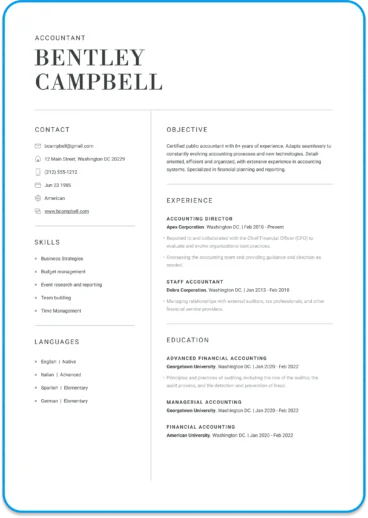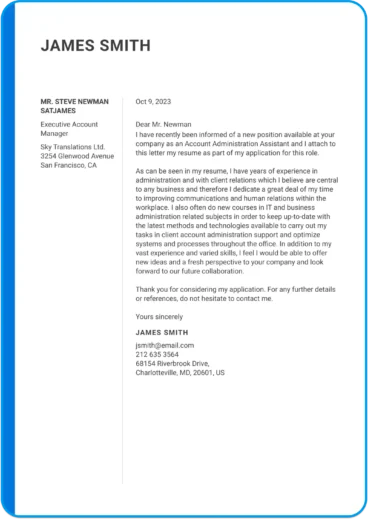Resume Templates
Resume samples

Create and edit your resume online
Generate compelling resumes with our AI resume builder and secure employment quickly.
Write a cover letter

Take a look at our cover letter guides and examples, to help you write a cover letter that complement your resume and enhace your applications.
Cover Letter Examples
Cover Letter Samples

Create and edit your cover letter
Use our user-friendly tool to create the perfect cover letter.
Featured articles
- How to Write a Motivation Letter With Examples
- How to Write a Resume in 2024 That Gets Results
- Teamwork Skills on Your Resume: List and Examples
- What Are the Best Colors for Your Resume?
Latests articles
- Flexible and Rewarding Jobs for Moms: 2025’s Top Picks
- Mastering LinkedIn Skills – Tips, Tricks, and Best Practices
- How To Survive Background Checks by Employers
- Best Online Jobs for Teens in 2025

Dive Into Expert Guides to Enhance your Resume

The Top Skills for your Resume: Examples and Guide
What skills to include, where to place them on your resume, and how to write them.

The skills you put on your resume are vital for showing employers your knowledge quickly. Knowing how to write one also helps incorporate vital keywords into your resume naturally and organically.
The following guide explains the difference between hard and soft skills. It also includes tips on how to write a skills section , what to avoid, and examples of meaningful skills to include on your resume that will help you land your dream job.
With these tips and our AI-powered resume builder , you can figure out the perfect skills that will impress the hiring manager in your sector .
Keep reading!
Example of a Skills Section in a Resume
Let’s start with the basics. Take a look at the following example to get an idea of what skills to put on a resume.
This resume skills section example will help you understand how to list your best qualities and make them align with your position .
Technical Skills:
- Proficient in Python, Java, and JavaScript
- Advanced knowledge of Microsoft Office Suite (Word, Excel, PowerPoint)
- Experienced in Adobe Creative Suite (Illustrator, Photoshop, InDesign)
- Skilled in using project management tools like Trello and Asana
- Fluent in English and Spanish
- Basic proficiency in French
Soft Skills:
- Strong verbal and written communication
- Team player and ability to collaborate effectively
- Proven adaptability and problem-solving abilities
- Resilient organization and time management skills
- Excellent customer service and client relations
Industry-Specific Skills:
- Experience with CRM software, such as Salesforce
- Knowledge of digital marketing tools, such as Google Analytics, for marketing jobs
- Familiarity with editing software, such as Final Cut Pro
- Proficiency with AutoCAD and SketchUp
Hard Skills vs. Soft Skills
Skills are typically categorized into soft and hard. Both categories encompass the broad range of technical or social abilities that are relevant to a working environment.
Soft skills
Soft skills are developed over time through relations and experience. The return on soft skill training is well worth it as 85% of career success comes from soft skills according to a LinkedIn report.
Also known as social skills, these abilities are considered personal attributes which are positive for jobseekers to bring to a professional situation.
Think of your character and choose some of your best personal traits . Consider how these attributes have either helped you to achieve something or have benefited your career in some way.
Soft skills are advantageous in a wide variety of professions , regardless of the industry or level of position.
How to identify soft skills
Soft skills are often inherent or cultivated over time and experiences. They are your interpersonal skills , such as your abilities to:
- Communicate
- Adapt
Apart from adding soft skills to a specific section, you can add them throughout your resume . Here’s an example of how you can add them to your experience section :
Marketing Manager ABC Corporation | New York, NY June 2018 – Present
- Led a cross-functional team to develop digital marketing strategies, improving lead generation by 25%.
- Demonstrated strong communication skills by collaborating with different departments to streamline campaign execution.
- Utilized problem-solving abilities to address client feedback and optimize campaigns, resulting in a 15% increase in customer satisfaction.
Hard skills
Hard skills refer to more technical , accumulative abilities specific to certain positions or industries. These key skills for your resume are tangible and usually developed through studies, courses, or on-the-job experience.
Good examples of hard skills for your resume are IT skills or the ability to speak a foreign language . Think about what skills are needed to do your job effectively and your level of proficiency for each.
- Do you have any specific computing abilities?
- Can you create a project budget or write up bidding contracts?
- Are you bilingual or proficient in a second language?
It is important to use a common, general range for measuring your level that all employers understand such as basic , intermediate , or advanced .
How to identify hard skills
Hard skills are acquired and sharpened through formal education , professional courses, or on-the-job experiences .
Some types of hard skills include:
- Software knowledge
- Engineering
Reflect on your education, past jobs, and certifications to identify these skills. Adding hard skills throughout your resume will also help you land an interview in no time.
Here’s an example of how you can add hard skills to your summary statement if you were a teacher :
Dedicated and compassionate elementary school teacher with 8 years of experience fostering a positive learning environment. Skilled in curriculum development, classroom management, and differentiated instruction to meet diverse student needs. Proficient in using educational technology tools, such as Google Classroom and Smartboards, to enhance learning experiences.
How To Present Your Skills Effectively
Presenting your skills on a resume effectively requires thought, precision, and a bit of strategy.
Essentially, the key is to emphasize relevance . This begins with a keen study of the job description. It’s there where you’ll find a dictionary of keywords that should resonate through your skills section.
The idea is not to echo these skills verbatim but to filter them through your own experiences and proficiency . Each skill should reflect a facet of the job role.
To make sure that your professional and personal (hard and soft) skills are relevant, you can do the following:
- Analyze the job description
- Research industry-specific skills
- Highlight relevant experience
- List transferable skills that can be used from your previous sector
- Prioritize soft skills if you don’t have transferable skills
Remember, the more precise your skills are, the more they resonate with employers.
How many skills should be on a resume?
If you’re asking yourself, “How many skills should I include on my resume?” it’s important to understand that there is such a thing as too many.
Finding the perfect balance is key. Too few skills could appear unimpressive, while an abundance of skills might be irrelevant and do more harm than good.
The objective is to feature your most relevant skills tailored to the job you’re targeting. For most job seekers, listing 10-15 skills throughout your resume is generally adequate .
Where To List Skills on Your Resume
Listing skills on your resume strategically grants potential employers insight into your assets at the right time.
Placing the skills section after the resume summary or objective and before the work experience section is deemed effective. This placement ensures employers can swiftly acknowledge your skills at a glance.
If you’re just embarking on your career journey or transitioning industries, including the skills section before your work experience may emphasize your relevant skill set and also diminish the focus on the lack of directly related experience.
In addition to a dedicated skills section, weaving in your skills alongside your experiences or achievements can accentuate the practical application of these abilities.
The key is not to merely list your skills in a dedicated section but to substantiate them through real-life examples and scenarios throughout your experience section and professional objective or summary.

Skills for Different Job Roles
First and foremost, start by carefully studying the job description . Chase the keywords you find there and modify your skills section to resonate with the job.
For instance, if you’re applying for a graphic design role, emphasize your proficiency in Photoshop, Illustrator, and layout design, alongside soft skills like attention to detail and effective communication.
The secret ingredient to making your skills section shine when addressing different job roles is specificity and relevance . For every job you apply to, let your skills section speak the language of the role, echoing its unique keywords and requirements.
What Not To Do When Writing Skills For Your Resume
Certain pitfalls must be dodged to present a stellar skills profile:
- Avoid vagueness and ambiguity : The skills section of your resume is no place for generalities or undecipherable jargon.
- Don’t present an exhaustive list of skills : Keep the list concise and focused, preventing it from becoming a bloated endorsement of every single skill you’ve ever acquired.
- Keep a balance between hard skills and soft skills : While hard skills demonstrate your technical prowess, soft skills are often the deciding factor for recruiters.
By steering clear of these, you can craft a skills section that not only accurately represents your abilities but also resonates with potential employers. Make sure you avoid errors by generating useful suggestions with our AI-powered resume builder to help you come up with the best skills for your application.
70+ Example Skills To Add To Your Resume
Not sure what to add?
Our resume editor with AI-powered suggestions . Simply type in the position you are interested in, and you’ll get a number of different skills that would beat Applicant Tracking Systems and catch a hiring manager’s attention.
Below, you can check out a variety of specific keywords for various industries to help you get started.
IT skills or computer-based program knowledge are highly favorable among employers today and they should be listed prominently in your resume . Examples of technical skills to include on your resume are:
- Microsoft Office
- Social media management software
- Graphic design software
- iOS / Android
- Google Drive
Below are common categories of resume skills you can research and include in your resume to fit the job sector you want to work in, such as blue-collar jobs , management positions, administrative roles, and more.
Financial and analytical skills:
- Financial statement analysis
- Budget forecasting and management
- Business intelligence reporting
- Market trend analysis
- Cash flow management
- Cost-benefit analysis
- Risk assessment and mitigation
- Data-driven decision making
Communication and interpersonal skills:
- Stakeholder communication
- Client relationship management
- Conflict resolution and mediation
- Public speaking and presentations
- Persuasive writing and pitching
- Cross-cultural communication
- Active listening and empathy
- Negotiation
Problem-solving and strategic thinking skills:
- Team building and motivation
- Performance management
- Mentoring and coaching
- Change management
- Delegation and task assignment
- Conflict management in teams
- Employee engagement strategies
- Agile project management
Administrative and organizational efficiency:
- Document management and filing systems
- Meeting coordination and minute-taking
- Calendar management and scheduling
- Travel arrangement and logistics
- Office supply management
- Data entry and database management
- Time tracking and productivity optimization
- Workflow automation
Marketing and creative content skills:
- Brand strategy development
- Content creation and copywriting
- Social media marketing
- Search engine optimization (SEO)
- Email marketing campaigns
- Graphic design and visual communication
- Video production and editing
- Marketing analytics and reporting
Construction and trades skills:
- Carpentry and woodworking
- Electrical wiring and troubleshooting
- Plumbing installation and repair
- Welding and metal fabrication
- Masonry and concrete work
- HVAC installation and maintenance
- Roofing and waterproofing
- Blueprint reading and interpretation
Manufacturing and production skills:
- Assembly line operation
- Quality control inspection
- Forklift operation and material handling
- CNC machine programming and operation
- Inventory management and stocktaking
- Equipment maintenance and repair
- Lean manufacturing principles
- Occupational health and safety compliance
Key Takeaways
Using a template and builder can make adding relevant or transferable skills to your resume much easier.
However, adding your hard and soft skills needs to be done carefully, which is why it’s critical to remember:
- Mix in your hard and soft skills throughout your resume
- Highlight the most relevant skills
- Focus on 10-15 hard and soft skills
- Study the job description to know which skills to add
As the old saying goes, “skills pay the bills”, and with these tips and tools, you’ll know exactly what to add to your resume to land an interview for your dream job !

Struggling with Resume Writing?
Ease the process with our templates
